Tired of Facing Challenges Alone? Find Your Community in Men's Group Therapy


Find the Right Group for Your Journey
We offer a safe, confidential space where men can open up, grow, and form genuine connections. Our experienced therapists guide you through meaningful conversations and shared support from peers who truly understand what you're going through.

Men's Group
This weekly group is for men who are tired of feeling stuck, stressed, or disconnected and are ready to make a change.
Whether you're overwhelmed with work, struggling in your relationships, or just feeling like something's off, you don't have to figure it out alone. In this group, you'll join other men who are also doing the work to show up more fully in their lives.
Together, we explore topics like:
The group offers structure, consistency, and real support, not just talk. Over time, many members report feeling more grounded, connected, and capable in their daily lives.
What Members Are Saying
"Andy creates a space where I finally feel safe to be real. The other guys get it - we're all dealing with similar stuff. It's changed how I show up for my family."
— Mike, Group Member for 6 months
"I was skeptical about group therapy, but this has been more helpful than years of individual sessions. There's something powerful about hearing other men's stories and realizing you're not alone."
— James, Group Member for 1 year

Ketamine-Assisted Group
This is a professionally facilitated ketamine-assisted psychotherapy group open to men and women.
Each group is guided through a structured process that includes preparation, medicine sessions, and integration, all held within a supportive group environment.
Using the power of set, setting, and community, this group supports men in addressing anxiety, depression, trauma, and emotional numbness. Learn more about Ketamine Assisted Psychotherapy.
This Group May Help You:
What Participants Are Saying
"The combination of ketamine and group support helped me break through years of depression. Isaac's expertise and the group's compassion made all the difference."
— Sarah, Completed 2-month program
"I've tried everything for my PTSD. This group gave me hope again. The medicine sessions combined with group integration helped me process trauma I couldn't touch before."
— David, Completed 3-month program
Our Process
Your Path to Healing and Connectionh
Reach Out To Us
Whether you’re curious about our men's group support, or ketamine group, we’ll answer your questions and discuss optoins.
Meet with a Licensed Therapist
Meet with a Group Facilitator. We’ll review your goals, your history, and what to expect in group. You’ll leave feeling ready and supported.
Do the Work, Together
Grow, heal, and connect. Consistent support from other men like you help turn insight into action and build the life you want.e.
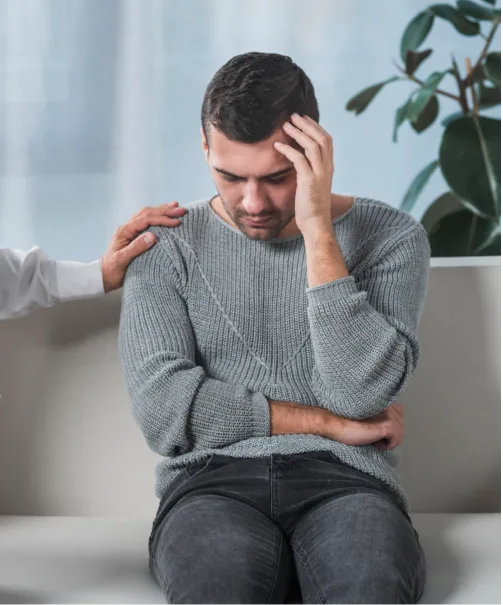
Signs That You Should Seek Group Therapy
- Feeling isolated or disconnected, even around others
- Struggling to express emotions and share your feelings
- Facing relationship issues that feel too big to handle alone
- Experiencing stress or anxiety that never seems to go away
- Difficulty coping with significant life changes or transitions
- Wanting to grow personally and find a space that supports your change
Learn how connecting with others and professionals can benefit you
What to Expect from Our Group Therapy Sessions
Our group therapy sessions for men provide a safe, confidential space where men can connect with others who understand the same struggles.
Led by skilled therapists, these groups discuss topics like relationships, family, anger management, masculinity, trauma/PTSD, work stress, and personal growth. Expect structured discussions and activities that provide practical tools that help you manage life’s challenges head-on.
In addition to conventional groups, we offer psychedelic-assisted group therapy for those looking to explore deeper emotional breakthroughs. Under professional supervision, Psychedelics can open new doors to understanding your personal challenges, adding a unique layer to your healing process.
Our goal is to promote personal development, mental well-being, and create a sense of belonging.
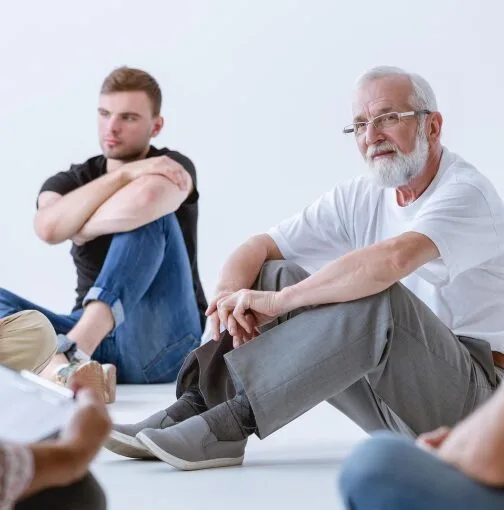

Ready to Get Started? Want to Learn More?
Fill out the form below and take the first step towards meaningful connections, empowerment, and growth.
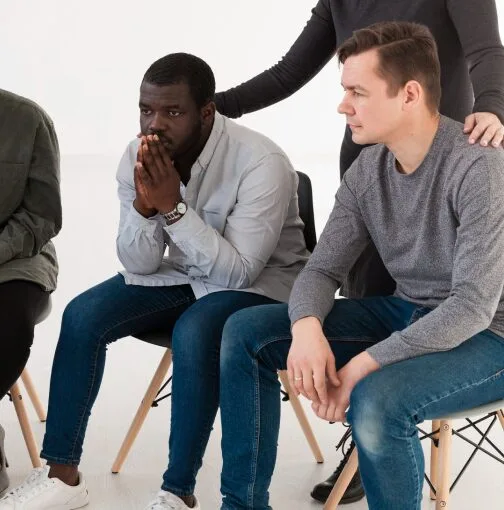
Common Difficulties Addressed in Group Therapy
Our men’s group therapy sessions address a range of emotional and mental health struggles in a space where trust and support are front and center. Here’s what we focus on:
- Relationship Issues: Navigate the ups and downs of personal, family, and professional relationships with understanding and clarity.
- Work-Related Stress: Discover better ways to manage stress and balance work demands without losing yourself.
- Personal Growth: Explore masculinity, vulnerability, and authenticity, and unlock new perspectives for self-improvement.
- Mental Health Concerns: Find a solid support system as you work through anxiety, depression, PTSD, and other challenges.
In these sessions, you’ll find a judgment-free space where open conversations are encouraged. Led by skilled therapists, each session helps you build coping strategies while learning from the shared experiences of other men.
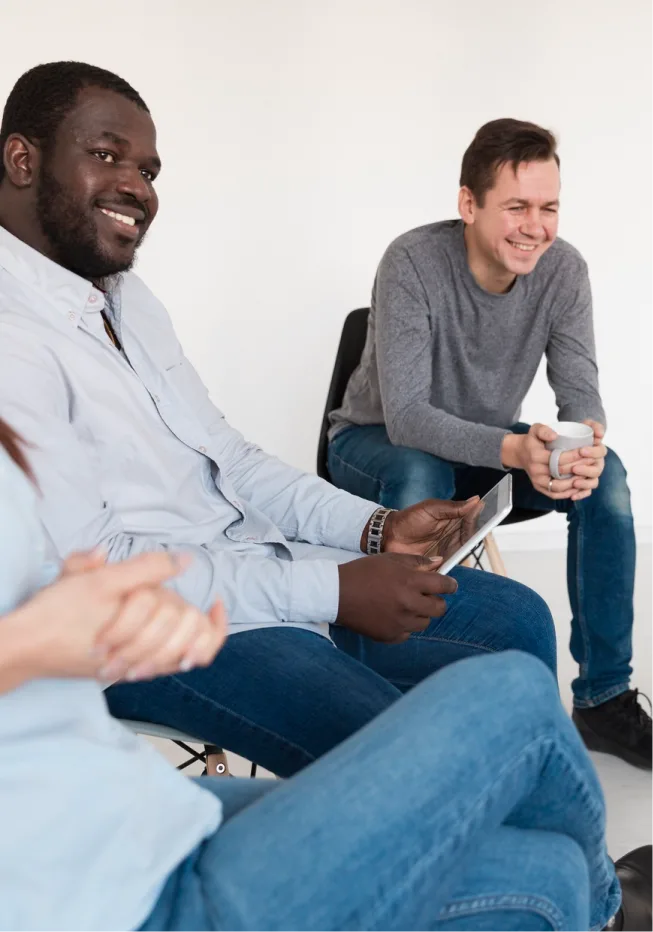
How Group Therapy Benefits Your Recovery Journey
- A Safe Space for Sharing: Open up in a confidential environment where your emotions are met with understanding.
- Discover Vulnerability and Authenticity: Experience the power of being real, fostering meaningful connections with men facing similar challenges.
- Guided Professional Support: Benefit from experienced therapists who help you develop coping strategies.
- Building Resilience: Address your struggles with the group’s support, fostering long-term emotional well-being.
- Offer Support to Others: Sharing your wisdom and experience with the group can help improve the lives of others.
- Mutual Understanding: Gain solace and strength from shared experiences and insights of others, knowing you’re not alone in navigating life’s challenges.
Deciding Between Group and Individual Therapy
It is encouraging to understand that one can combine both group and individual counseling to enhance the healing journey, creating a comprehensive support system.
However, when choosing between the two, the decision will depend on personal preferences for exploring growth.
Individual therapy provides one-on-one attention, allowing for a deep exploration of personal issues in a private setting with a therapist fully focused on your unique needs.
On the other hand, group therapy offers the advantage of shared experiences and community support. In this setting, you’ll connect with others facing similar challenges, gaining new perspectives and the comfort of knowing you’re not alone. Group discussions often focus on common themes like relationships, masculinity, and work stress.
Both approaches have their strengths—individual counseling offers personalized guidance and confidentiality, while group counseling fosters camaraderie and diverse insights. Exploring both can help you decide which path best supports you.

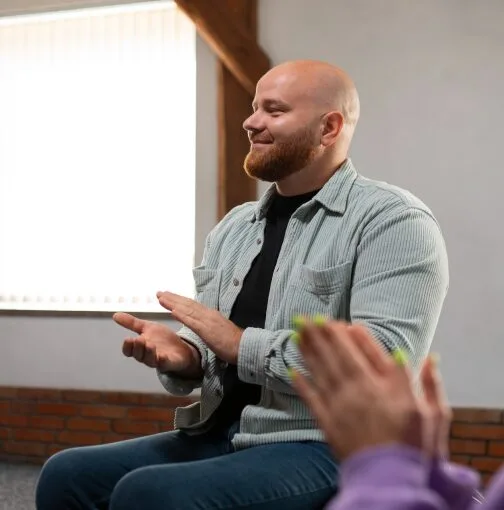
Understanding Support Groups vs. Group Therapy
Group therapy for men offers a different approach compared to traditional support groups. While support groups focus on peer support and shared experiences, men’s group therapy sessions are led by experienced mental health professionals who offer structured, therapeutic guidance.
This approach allows for deeper personal exploration, using evidence-based techniques to address individual challenges.
In a men’s therapy group, you benefit from the skilled therapist’s direction, learning coping strategies that promote emotional healing. The structured nature of group therapy advances mental health goals through a balance of professional insights and peer support.
For men seeking a more comprehensive method to address mental health concerns, group therapy offers a well-rounded and supportive solution.
Take the Next Step Toward Healing
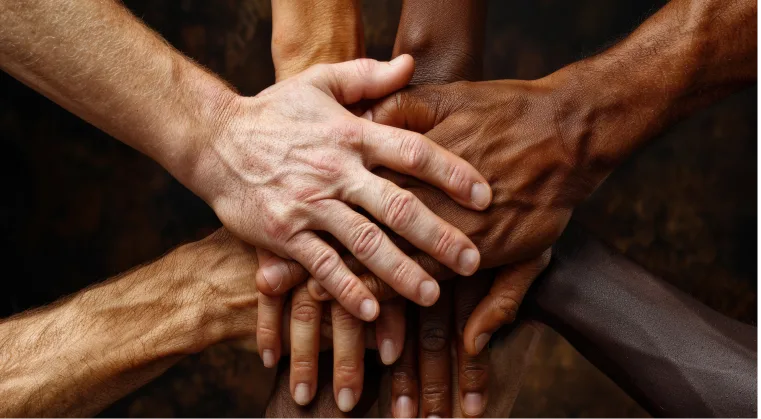
Your Questions, Answered
1. How many participants are there in the group program?
Our group therapy programs typically include 6 to 12 participants. This size ensures a balance—everyone gets a chance to engage and share, while still benefiting from the diversity of perspectives in the group.
2. What is the frequency and duration of your group therapy sessions?
Group therapy sessions are generally held weekly and last about 90 minutes. This consistent schedule provides ongoing support and ample time for thorough exploration of topics and personal growth.
3. What if I don’t get along with another group member?
It’s possible that conflicts may arise, but our therapists at Denver Men’s Therapy are skilled at managing such situations. We work to address any issues professionally, maintaining a respectful environment for all participants.
4. I'm nervous about sharing my story with a group. Is this normal?
Feeling nervous is completely normal. Many participants feel the same way at first, but as trust builds within the group, sharing becomes easier, and the support you receive can be incredibly empowering.